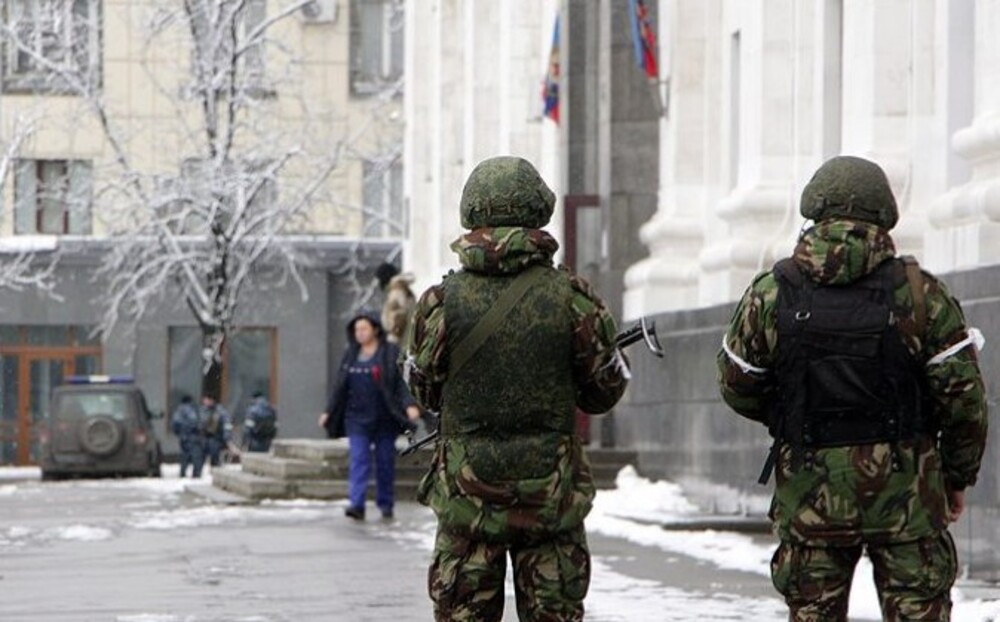Russian controlled ‘Luhansk republic’ bans all Protestant churches.

The self-proclaimed ‘Luhansk people’s republic’ has refused to ‘re-register’ all communities of Baptist, Pentecostal, Seventh Day Adventist and other Protestant churches, with this meaning that believers could face fines or arrest merely for prayer gatherings in private homes Such a blanket refusal suggests that this was always the Russian-backed militants’ aim in introducing a system of ‘re-registration’. Maksym Vasin, Director of the Institute for Religious Freedom [IRF], suspects that the information gathered about Evangelical communities and their members may be used for further religious persecution.
IRF has learned from a number of communities that all Evangelical Christian communities have been refused the so-called re-registration, with this meaning a total ban on any group religious activities on territory under the militants’ control. One of the communities in the Luhansk oblast told IRF that they have been told that their premises no longer belong to them.
As reported earlier, a ‘law’ from February 2018 obliged all religious communities under ‘LPR’ control to undergo the so-called re-registration within the next six months, with this later extended until 15 October. The procedure proposed included getting a supposedly ‘expert assessment’, with the latter now cited, seemingly without real explanation, as excuse for rejecting the applications.
This same ‘law’ effectively placed in question the continued activities of churches of the Ukrainian Orthodox Church of the Kyiv Patriarchate. The Moscow Patriarchate’s (and Moscow’s) extremely hostile reaction to the Ecumenical Patriarchate of Constantinople’s endorsement for an autocephalic Ukrainian Orthodox Church last week is also likely to exacerbate the difficulties, or downright persecution, that any believers of churches under the Kyiv Patriarchate face in occupied territory – whether in ‘LPR’, the self-proclaimed ‘Donetsk people’s republic’ or in occupied Crimea.
Religious persecution is nothing new in the Russian-controlled ‘republics’. On 26 September this year, armed ‘LPR’ militants seized an Evangelical Baptist House of Prayer in Brianka and drove out the believers, turning the whole place upside down. They left only after it was made clear to them that the building was the private property of one of the believers.
This was not the first such armed raid and / or seizure of churches in areas until Kremlin-backed militant control. On 6 July this year, Alexander Moseychuk, Pastor of the New Life Church in Makiyivka [under ‘DPR’ control] reported that seven ‘DPR’ militants, some of them armed, had burst into the church and announced that it was being taken over.
In both of the above cases, the churches had been active in helping people in need since the beginning of the military conflict.
According to the Institute for Religious Freedom, there were similar moves on 10 June against the Church of the Holy Spirit in Donetsk, which is under the Ukrainian Orthodox Church of the Kyiv Patriarchate. The church was forcibly closed by people from the so-called ‘DPR state property fund’. On 27 March 2018, men in military gear turned up at a Baptist place of worship in Stakhanov [within ‘LPR’], forced their way into the premises and took out everything, including furniture and items used during services.
The situation varies somewhat in the two Kremlin-controlled ‘republics’, however both demonstrate the same basic intolerance for all faiths, except the Orthodox Church under the Moscow Patriarchate. ‘DPR’ is also demanding ‘re-registration’, with the only difference being that religious communities have been given until 1 March 2019.
As was to be expected, the Orthodox Church under the Moscow Patriarchate will not have to go through any of this, and will instead have a simplified ‘legalization’ process.
Both ‘DPR’ and ‘LPR’ are directly following Russia in repressive measures against the Jehovah’s Witnesses. ‘DPR’ recently banned almost all Jehovah’s Witness material, claiming it to be ‘extremist’, while in February ‘LPR’ banned the Jehovah’s Witnesses and other ‘non-traditional’ faiths. This was after they passed several ‘laws’, including one aimed at hunting down and prohibiting so-called extremism in religious or political organizations, as well as in the media.
On 28 August 2017, they claimed that the Jehovah’s Witnesses were helping Ukraine’s Security Service [SBU] and “neo-Nazi groups”. An investigative search had supposedly established not only that the Jehovah’s Witnesses in Luhansk and Alchevsk were in breach of ‘LPR law’, but that they were probably “agents of influence of the Ukrainian Security Service.
The militants do not only target Christian churches. As reported, the only mosque remaining in occupied Donetsk was closed in late June, after an armed search and interrogation of the Imam and worshippers. The so-called ‘DPR law’ on countering extremist activities was cited as the grounds.
Churches under the Moscow Patriarchate have enjoyed special treatment from the beginning, with religious persecution of all other faiths becoming a grave problem from the beginning of the Russian-backed, manned and armed military conflict in April 2014. See, for example, Russia-backed ‘Cossack’ fighters take oath in Moscow Patriarchate church to fight against the Ukrainian ‘enemy’.
Author: Halya Coynash
Source: khpg.org